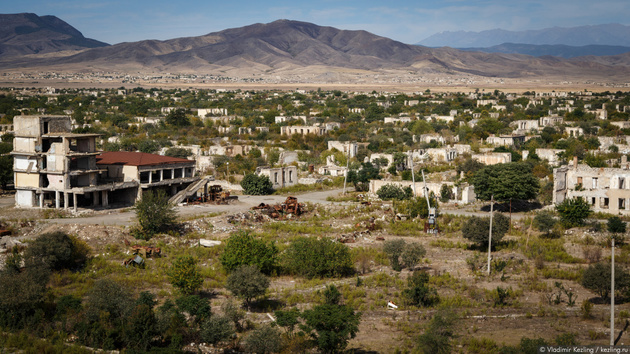Last week the issue of resettlement of Armenians from Lebanon and Syria to the territory of the so-called "NKR" was actively discussed. The media wrote about a grandiose occupied territories settlement program that is being prepared in Armenia, as well as about the secret placement of separate militarized cells of Kurdish gangs. According to foreign media outlets, preparations for a full-scale aggression in Nagorno-Karabakh, which may be carried out by the hands of Middle Eastern mercenaries or as a result of a large-scale migration project, are not ruled out in Armenia.
Speaking about the resettlement of large numbers of people, it is important to understand that it is not carried out solely on the basis of ethnic kinship. The resettlement of people requires the necessary appropriate economic base and infrastructure. This applies primarily to affordable housing and employment. Theoretically, there should be no problems in Armenia and "NKR" with accommodating at least the first wave of migrants, since the outflow of population from the countries continues. However, neither state nor municipal services are in a hurry to publish data on the real state of the housing stock in Armenia and occupied Karabakh.
On the other hand, over more than a quarter of a century the blockaded economy of Armenia and occupied Karabakh led to deurbanization, which became a natural consequence of the unsettled Karabakh conflict. The average Armenian citizen is forced to support his own economy, relying on himself, and not on wages. The conditions for doing business in Armenia and "NKR" are extreme, since transport restrictions significantly increase the final cost of any product, and the prospect of living in a subsistence economy can hardly be called attractive even for refugees. The economy of Armenia and the self-proclaimed "NKR" is unable to find jobs for tens of thousands of people in a short period of time, if only because the financial structures of Armenia are largely focused on the funds of the foreign Armenians, and not on their own production. In this regard, experts are skeptical about any large-scale resettlement.
In addition to the economy alone, there are also mental peculiarities that in one way or another prevent any radical change in the ethnic map of the self-proclaimed "NKR". The occupation of seven regions adjacent to Nagorno-Karabakh was held under the slogan "liberation of the ancestral lands", forming a whole generation of "liberators". Now Karabakh is in many ways an ethno-territorial space in which the idea of "liberation" is supported at all levels up to the education of the younger generation. No program is able to prevent a possible conflict between the militaristic worldview of an impressive part of today's Karabakh public and any cultural influence that does not perceive the ideology of confrontation. For Syrian an Lebanese Armenians, it is unnatural to be in conditions of ideological hostility towards their neighbors or the Turkic world. The cultural paradigm that took root in Armenia and "NKR" during the years of the blockade is unlikely to be able to offer the settlers anything other than assimilation. Particular cases of resettlement are possible, but it is extremely difficult to speak of something global.
The ability of the Armenian intelligence to negotiate with the Kurdish underground, with which only the strongest Western intelligence services were ready to cooperate due to its unpredictability, also look dubious. It is difficult to imagine what kind of support the militants of the Kurdistan Workers' Party (PKK) can provide to the Karabakh separatists, taking into account that the Kurds are not included in the list of peoples friendly to Armenia, since they were involved in the tragic events in the Ottoman Empire in 1915. In the case of the Kurds, the favorite principle of Armenian foreign policy "the enemy of my enemy is my friend" clearly does not work. For the Armenian nationalists, Karabakh is an "Armenian patrimony", and the Kurdish military presence on the "primordially Armenian land" seems to be something abnormal.
As for the change in the demographic situation in the occupied territories of Azerbaijan, it has already changed - this happened during the period of the Karabakh bloodshed, as a result of which millions of Armenians and Azerbaijanis left their homes and became refugees and internally displaced persons.






